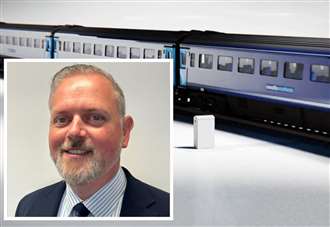By Layla Laidouci
A new type of technology is being trialled on a Kent railway line “prone to issues” to help keep trains running, even during sweltering temperatures.
Southeastern has teamed up with Flint Engineering, a green tech startup, to combat excessive heat bringing services and signalling to a halt on the Tonbridge to Hastings line.

The line, which was built between 1845 and 1852, has a reputation for climate-related challenges, including landslips.
Now, an “innovative” thermal solution – believed to be the first of its kind on any railway in the UK – is being trialled to help bolster the route’s performance and prevent disruption to commuters.
Network Rail, the body responsible for looking after the nation’s railways, believes it could be a gamechanger.
A spokesperson said: “We work really hard to ensure the railway is as reliable and safe as possible.
“In recent years we’ve invested considerably in the Tonbridge to Hastings line because, as regular passengers will know, it has been prone to issues.”
According to Flint, its IsoMat technology can instantly and silently transfer heat without power, maintenance or internal modification.
It takes the form of a flat sheet, fitted externally on signalling cabinets to capture and deflect energy from the sun.
The innovative solution reinvents traditional heat pipe technology through a revolutionary flat aluminium design featuring an internal network of sealed channels.
When exposed to extreme temperatures, the liquid within these channels undergoes a rapid cycle of evaporation and condensation, resulting in near-instantaneous heat transfer.
Early trials conducted by Network Rail showed positive results, with a reduction in peak internal temperatures of more 21%, it says.
The IsoMat’s successful pilot scheme comes after proof of concept work was carried out at Tonbridge Depot last summer.

David Davidson, chief operating officer at Southeastern Railway, said: “As extreme weather events become more common, we need innovative solutions to protect our infrastructure, and most importantly keep our passengers and freight customers on the move.
“Flint’s IsoMat technology provides a simple, effective solution to a complex problem, helping us maintain service reliability even during heatwaves.”
The trial accompanies Network Rail’s exploration of other sustainable solutions including passive cooling technologies.
Network Rail nationally owns 20,000 miles of track home to signalling boxes which can exceed 70 degrees in hot weather.
Resulting system failures are known for creating delays, service disruptions and a heavy maintenance bill.
The company is highlighting the importance of increasing its resilience against climate challenges after England’s fourth heatwave this summer.
